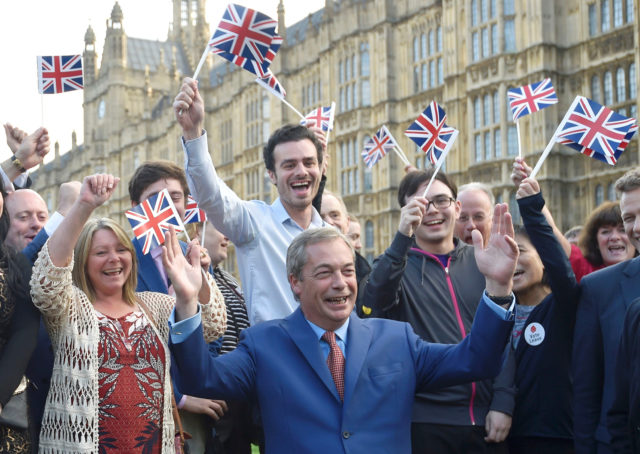By Barbara Slavin
The results of the British referendum on leaving the European Union are another reminder of how much more thoughtful and yes, mature, the millennial generation is turning out to be.
By large majorities, Britons under 45 voted to remain in the EU while their elders, with fewer years to bear the consequences, tossed the dice and went for Brexit.

People gathered in The Churchill Tavern, a British themed bar, react as the BBC predicts Briatin will leave the European Union, in the Manhattan borough of New York, U.S., June 23, 2016. (Reuters)
The immediate result was a global stock market swoon and panicked commentaries about the twilight of Western democracy. In Britain, sellers’ remorse came fast as many of those who voted to leave the EU began to appreciate the negative ramifications of their votes.
Divorce proceedings with the EU are likely to be protracted. Indeed, the marriage might actually endure after all if the British parliament or some future prime minister, after the hapless David Cameron, decides to ignore the results of what was, legally if not politically, a nonbinding referendum.
Fears of Scotland and Northern Ireland voting to leave the United Kingdom so they can remain in the EU could also affect the actions of the next British government.
It is important to remember that Britain has never been a model member of the European project. It was not among the six original members of the European Coal and Steel Community founded in the aftermath of World War II and it chose to retain its own currency after the launch of the euro in 1995.
Gerard Araud, the sage and witty French ambassador to the United States, remarked at an event at Washington’s International Student House on the eve of the vote that Britain has always had “one foot in the EU and one foot out” and in the event of Brexit, “it would be the reverse.”
The millennials, meanwhile, will vote with their feet for continued integration. If good-paying jobs move from the City of London to Frankfurt, Paris or Milan, they will, too. Whether their number includes young Brits depends on the terms of Brexit and whether Britain remains a member of the single European market.
In Britain, as in the United States, the young are better educated, more adaptable in their career choices, more tolerant and less fearful of immigrants. Unlike many of their elders who were left behind by globalization, millennials were weaned on it. They understand that diversity and the free flow of ideas foster innovation and economic progress. The aging baby boom generation owes it to their children and grandchildren not to ruin their prospects.

Nigel Farage, the leader of the United Kingdom Independence Party (UKIP), makes a statement after Britain voted to leave the European Union in London, Britain, June 24, 2016. (Reuters)
There is no doubt that the British government – like successive U.S. governments – has failed to adequately compensate for the dislocations caused by globalization and technological change. In the wake of Brexit, leaders must do more.
Instead of exploiting fears and stoking ethnic nationalism, responsible politicians should explain that building walls and raising tariffs will not save jobs in unproductive industries and that immigrants often start the very businesses that provide jobs to the native-born.
Governments everywhere should promote needed infrastructure, especially green energy, which will have the dual effect of helping to alleviate climate change and also provide new blue-collar jobs to substitute for those lost to manufacturing. In the United States, the presumptive candidates of both political parties agree on the need for massive spending to repair rotting bridges and roads and to build new facilities worthy of the 21st century.
More money must also go to education to provide workers the skills they will need for the jobs of the future.
The presumptive Republican nominee, Donald Trump, seems to think he can increase infrastructure spending while lowering taxes and still reducing the budget deficit. Trump also thinks that Brexit was a great idea, if only because it will make it cheaper for American tourists to visit his golf courses in Scotland now that the pound has crashed. That’s assuming, of course, that the “Scotch,” as Trump incorrectly called the Scots — confusing the people with the beverage they are best known for making — decide to stay in the United Kingdom.
Trump and other politicians, especially those over 50, have a responsibility to speak honestly about the unstoppable nature of globalization. In the age of the Internet, there is no “taking back your country,” as the Brexit boosters and Trump assert. There’s no better evidence of this than the huge number of Brits who went on line and googled “EU” – unfortunately, only after voting to leave it.
In the aftermath of the vote, U.S. officials have sought to reassure UK citizens and the other 27 members of the EU that the United States will maintain its historic relationships with all of them, no matter what happens. An upcoming NATO summit in Poland will likely take on new importance as a remaining body that brings together Britain, continental Europeans and the United States.
President Barack Obama expressed understanding for those “whose lives have been disrupted” by globalization while reminding his audience at a Democratic Party fundraiser in Seattle that “we are at this moment in time in which the opportunities have never been greater, where young people are more educated and more sophisticated and more engaged and more involved than ever before.”
The task of leaders is not to ruin their future, Obama said.
“If you talk to them, you meet them, you can’t help but think our best days are ahead of us,” Obama continued. “But we got to do our jobs so that they can actually realize that extraordinary potential. We can’t screw up so bad that they can’t fix it.”
Barbara Slavin is Acting Director of the Future of Iran Initiative at the Atlantic Council in Washington.

